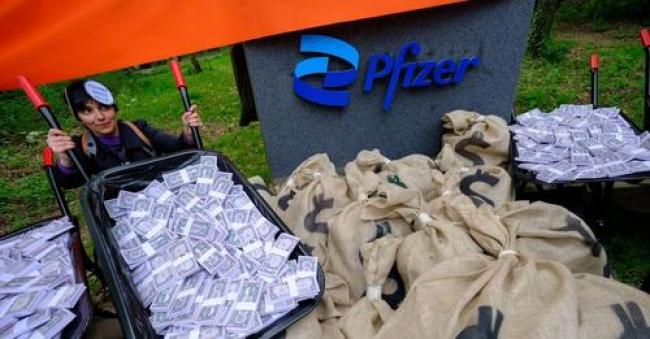Articles Menu

Apr. 28, 2022
As major pharmaceutical executives and investors convened virtually on Thursday for their annual shareholder meetings, campaigners took to the streets in the U.S., the U.K., India, South Africa, and elsewhere to condemn major drug companies for hoarding technology and prioritizing profits over equitable distribution of coronavirus vaccines.
"Thousands of people are still dying every day because protections against the coronavirus have not been made accessible to all."
Outside Pfizer's U.K. headquarters, activists dropped mock sacks of money and positioned wheelbarrows full of fake cash near the building's entrance to denounce the New York-based company's opposition to tech transfer initiatives and other efforts to expand coronavirus vaccine production in developing nations, where billions have been denied access to the shots.
Pfizer has also faced backlash for obstructing African countries' attempts to study Paxlovid, the company's oral anti-viral treatment for Covid-19.
"I'm protesting at Pfizer today because it's sickening that they're celebrating record profits while refusing to share the technology with countries in the Global South who could manufacture these lifesaving medications," said Tarun Gidwani, a member of the Global Justice Now Youth Network. "When over 80% of people in low-income countries still haven't received a single jab and deaths are still mounting, this is unconscionable: Pfizer has blood on its hands."
To drive that message home, activists laid out a banner covered in red handprints alongside the wheelbarrows of cash signifying Pfizer's massive pandemic windfall.
During Pfizer's shareholder meeting, healthcare activist Ady Barkan presented a resolution pushing the company to support the transfer of vaccine technology to boost production and access across the globe. The resolution, sponsored by Oxfam America, fell short, garnering 27% of the vote from shareholders.
"We are in the midst of the greatest public health crisis in 100 years," Barkan, the founder and co-executive director of Be A Hero, said in a prerecorded message played at the meeting. "Despite safe and effective vaccines like Pfizer's, thousands of people are still dying every day because protections against the coronavirus have not been made accessible to all."
"Billions of people remain unvaccinated in part because Pfizer cannot produce enough doses on its own," Barkan continued. "And yet, Pfizer refuses to share its technology to boost global manufacturing."
Ady Barkan presents Oxfam resolution at Pfizer's annual shareholder meeting. Watch video here: https://youtu.be/uuhMVZhfyYM
"These companies have now fleeced this pandemic for more than enough money."
In South Africa, activists rallied at the World Health Organization's (WHO) technology transfer hub to protest Moderna's attempts to undermine the facility's work. Later Thursday afternoon, activists are expected to hold a die-in outside of Moderna's headquarters in Boston, Massachusetts.
As Common Dreams reported in February, scientists working with the WHO's South Africa hub created a close replica of Moderna's mRNA-based coronavirus vaccine without any aid from the company, but advocates are concerned that Moderna could use its existing patents in South Africa to take legal action against the researchers.
In an "unprecedented" step for the U.N. agency, WHO Director-General Tedros Adhanom Ghebreyesus introduced an Oxfam-drafted technology transfer resolution at Moderna's virtual shareholder meeting on Thursday, calling the lack of access to vaccines in low-income countries a "failure of humanity."
"If Moderna worked with us, we could submit the WHO's Covid-19 Vaccine mRNA Technology Transfer Hub's vaccine for approval at least one year sooner, which would save lives, decrease the risk of variants, and reduce the pandemic's economic toll," said Tedros. "We urge Moderna to share technology and know-how with the WHO hub and commit to not enforcing patents for Covid-19 and other essential vaccines in countries hosting the WHO hub and spokes."
The Moderna resolution also failed to receive majority support, winning 24% of the nominal vote from shareholders.
"We are pleased to see that nearly 30% of Moderna and Pfizer's investors agree that the companies should explore the feasibility of transferring its technology to spur manufacturing in low- and middle-income countries," Robbie Silverman, Oxfam America's senior manager of private-sector advocacy, said in a statement.
"This is the first time that shareholders have voted for a resolution like this on any company proxy ballot," Silverman added.
More than two years into the pandemic, just 15.3% of people in low-income countries have received at least one coronavirus vaccine dose.
The death toll from the ongoing public health crisis has been staggering, directly killing more than 6.2 million people globally. When excess mortality—which includes lives taken directly and indirectly—is taken into account, the coronavirus death toll is believed to be millions higher.
Meanwhile, pharmaceutical giants have raked in enormous profits from coronavirus vaccines that were developed with the help of substantial public funding. A recent analysis by the People's Vaccine Alliance estimated that Pfizer, BioNTech, and Moderna are making combined profits of $65,000 every minute—or $93.5 million a day.
Thus far, the governments of rich countries have declined to use their leverage to force pharmaceutical companies to share their vaccine technology with low-income nations. The U.S. and top European Union countries have also hindered progress toward a waiver that would suspend patent protections for the duration of the pandemic.
"Pharmaceutical companies have exploited a global health crisis for their own gain," Julia Kosgei, policy adviser for the People's Vaccine Alliance, said Thursday. "They profited from an artificial scarcity of vaccines that was driven by their own monopolies on publicly-funded scientific innovations. They prioritized high-priced doses for rich countries while people were left to die in the Global South. This should be a moment of reckoning for Big Pharma."
"These companies have now fleeced this pandemic for more than enough money," Kosgei continued. "Governments must take strong action to ensure pharmaceutical companies transfer the technology needed for Global South countries to make vaccines and treatments for themselves, including waiving intellectual property rules. It's time to crack the Covid cartels."
[Top photo: Vaccine equity campaigners hold a demonstration outside of Pfizer's U.K. headquarters on April 28, 2022 in Tadworth. (Photo: Jess Hurd via Global Justice Now)]